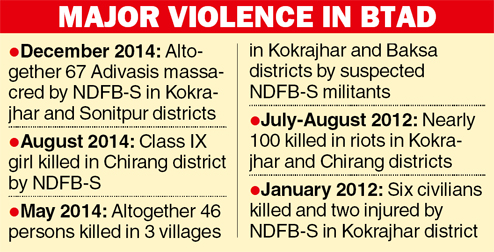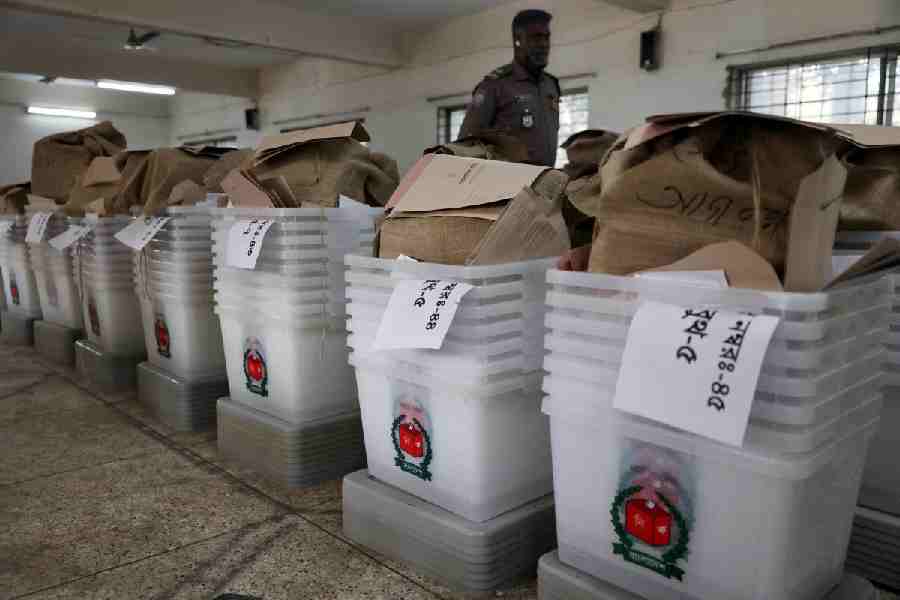
Balajan Tiniali (Kokrajhar), Aug. 19: With just the mention of "ongoing operations by security forces", Kumanto Nath, a paan shop owner here, gets angry. "We have heard about such operations earlier too. Nothing happens," he says.
On August 5, Nath saw 14 innocent people being shot dead, 17 getting injured and at least four shops adjacent to his being gutted in a grenade attack by militants. His shop remained shut for four days.
Balajan Tiniali, a market nearly 10km north of Kokrajhar, was the latest flashpoint of frequent violence in BTAD (comprising Kokrajhar, Chirang, Baksa and Udalguri districts) that is increasingly leaving residents like Nath angry and frustrated. Many of them stress that the "government's failure" to tame the militant groups and resolve the conflict over land between migrants and the indigenous population would always keep the BTAD on the boil.
"After every incident, the government just gives cash compensations to the victims' families and talks about security operations. They make some arrests, kill some boys and wait for another attack," alleges Rathin Basumatary, a college student in Kokrajhar.
The Balajan attack prompted the Assam government to announce "zero tolerance" against militancy for the third time since 2014. The centre rushed additional forces and the operations against the active militant groups "intensified" immediately. A similar drill followed soon after the rebel group NDFB (S) had carried out attacks in May and December 2014 (see chart).
Almost 20 months after that operation, during which at least 50 militants were killed and over 500 cadres and linkmen arrested, top leaders of NDFB (S), G. Bidai and his deputy K. Batha continue the killings and abductions.
The two factions of NDFB - NDFB (Songbijit) and NDFB (Saoraigwra) - are carrying out acts of violence in BTAD and neighbouring Sonitpur districts for a "sovereign Bodoland". Security officials say# top leaders of the two active groups sneaked into Bhutan and Myanmar and it needed the Centre's diplomatic intervention for flushing them out of their bases in these countries.
"Bhutan is assisting us, but we can't just step into their territory," said an Assam police official, blaming the "difficult terrain" and their limitations on Bhutan border (Assam shares a 267km border with Bhutan).
Militants reach Arunachal Pradesh from central Assam's Soniptur district and use the jungle routes through the 520km long border the state (Arunachal) shares with Myanmar to reach their camps. NDFB (Saoraigwra) is part of the United National Liberation Front of Western South East Asia, a forum of rebel groups such as Ulfa (I), NSCN (K) and Kamtapur Liberation Organisation (KLO).
Public relations officer (defence) Lt Col Suneet Newton, when asked about the ongoing operation, declined comment.
Many in BTAD say a solution with the rebel groups, which are in ceasefire for years, is as important as taming the active rebel groups such as NDFB (S). Talks with NDFB (Progressive) and NDFB (Ranjan Daimary) are on hold since 2014. Similar is the case with at least four Adivasi militant groups - Birsa Commando Force, Santhal Tiger Force, All Adivasi National Liberation Army and Adivasi People's Army - who had agreed to lay down arms in 2009 for a solution. Scheduled Tribe (ST) status for nearly 80 lakh Adivasis in the state is their main demand.
"Such delay frustrates the cadres and lower rank leaders and they move out and form a new group. People suffer as they again resort to violence for money," chairman of Birsa Commando Force, Durga Hasda told The Telegraph. National Santhal Liberation Army and Adivasi Dragons, two splinter militant groups carrying out extortion and abduction, are said to be the result of such delay in dialogue with the groups in ceasefire.
Over 300 illegal arms, including sophisticated AK-56, AK-47, US-made M16 and German-made HK33 rifles, have been seized since January 2015 but making BTAD free of illegal arms is still a challenge for the security forces because of the militant group's links with Myanmar-based suppliers. "Peace is impossible till all arms are seized and the supply routes are sealed," said Promod Boro, president of influential All Bodo Students' Union.
Jhanin Mushahary, a conflict studies teacher in Bodoland University, Kokrajhar, termed the anti-insurgency operation as "just a short-term measure" and insisted on giving jobs to youths in order to stop them from joining such groups.
BTAD was constituted in 2003 to put an end to violence but the incidents similar to Balajan Tiniali, the inability to arrive at a solution to the decades-long agitation for a Bodoland state and the conflicts over land has kept the region troubled. With its 22.9 lakh population spread over 8,322 square km, BTAD at present has 2,033 police personnel against a sanctioned strength of 2,680, apart from paramilitary forces and the army.











